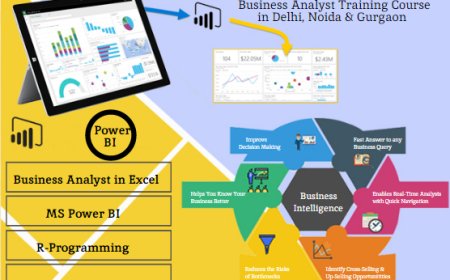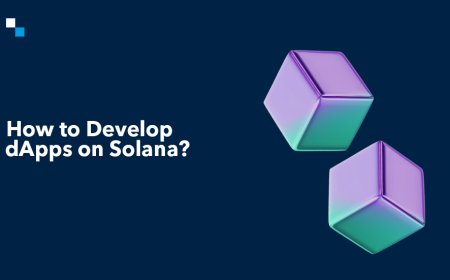How Can AIOps Platform Development Services Improve IT Operations?
Discover how AIOps platform development services enhance IT operations by automating tasks, reducing downtime, and boosting efficiency.

In today's digital-first world, IT operations are more complex than ever. With the rise of cloud computing, hybrid environments, edge computing, and massive data inflows, traditional monitoring and incident response methods are often insufficient. This is where AIOps (Artificial Intelligence for IT Operations) steps in as a game-changer.
By integrating machine learning (ML), big data, and automation, AIOps platform development services can transform how businesses manage their IT infrastructure. These platforms offer real-time insights, predictive analytics, and intelligent automation, helping IT teams stay ahead of issues, reduce downtime, and drive efficiency.
In this blog post, we explore how AIOps platforms work and how they significantly improve IT operations.
What Is AIOps?
AIOps stands for Artificial Intelligence for IT Operations. It refers to the use of AI technologiesparticularly machine learning and data analyticsto automate and enhance IT operations. AIOps platforms aggregate and analyze data from various IT tools and devices to:
-
Detect anomalies
-
Predict incidents
-
Automate root cause analysis
-
Enable proactive responses
Gartner defines AIOps as a multi-layered technology platform that uses big data and machine learning to support all primary IT operations functions through the scalable ingestion and analysis of the ever-increasing volume, variety, and velocity of data generated by IT.
Challenges in Traditional IT Operations
Before diving into the benefits of AIOps, its important to understand the limitations of traditional IT operations, such as:
1. Alert Fatigue
Operations teams receive thousands of alerts daily, many of which are false positives or duplicates. This often leads to "alert fatigue," where critical alerts get missed.
2. Reactive Incident Management
Traditional IT relies heavily on manual monitoring and reactive troubleshooting. Teams often dont learn about an issue until users report it.
3. Siloed Toolsets
Many enterprises use multiple monitoring tools that dont communicate with each other, creating data silos and making holistic analysis difficult.
4. Slow Root Cause Analysis
Manual root cause analysis is time-consuming and often inaccurate due to the complexity of distributed systems.
5. Scaling Issues
As businesses grow, their infrastructure becomes more complex, making it harder to manage performance, availability, and compliance manually.
Key Capabilities of AIOps Platforms
Modern AIOps platforms offer a rich set of capabilities tailored to address the challenges mentioned above. These include:
1. Data Aggregation
AIOps platforms collect data from a wide range of sourceslogs, metrics, events, alerts, and traces. This data is then normalized and stored for analysis.
2. Anomaly Detection
By using machine learning, the platform can identify unusual patterns in performance or behavior, helping teams detect issues before they impact end users.
3. Event Correlation
AIOps correlates data across systems to reduce noise. This helps identify the real issue amidst a flood of alerts and provides context for rapid resolution.
4. Predictive Analytics
AIOps platforms can forecast potential issues by recognizing patterns that precede failures. This enables proactive remediation.
5. Automated Root Cause Analysis
AI algorithms trace the sequence of events leading up to an incident, identifying the root cause faster and more accurately than human analysis.
6. Intelligent Automation
AIOps platforms often integrate with ITSM (IT Service Management) tools and orchestrate automated workflows for incident resolution, ticket creation, or escalation.
Benefits of AIOps Platform Development Services
When organizations opt for custom AIOps platform development services, they unlock a wide range of benefits tailored to their infrastructure and business needs.
1. Enhanced Incident Response Times
Through automation and predictive analytics, AIOps platforms detect and resolve issues faster. This reduces Mean Time to Detect (MTTD) and Mean Time to Resolve (MTTR), improving system availability.
2. Reduced Operational Costs
By automating repetitive tasks and minimizing downtime, AIOps helps cut down on labor costs and reduces the financial impact of system failures.
3. Increased System Uptime
Predictive maintenance and real-time monitoring ensure high availability of critical systems, which is vital for customer satisfaction and business continuity.
4. Scalability and Flexibility
AIOps platforms are designed to scale with your IT infrastructure, whether its on-premises, cloud-based, or hybrid.
5. Improved Collaboration Across Teams
With centralized dashboards and shared analytics, AIOps fosters better communication between development, operations, and security teams.
6. Custom Intelligence for Your Environment
Custom AIOps platform development ensures that your AI models and automation scripts are trained on your data, tuned to your unique architecture, and aligned with your business goals.
Real-World Use Cases
Here are a few real-world examples where AIOps platform development services have proven their value:
? E-commerce: Proactive Downtime Prevention
An e-commerce platform experiencing traffic spikes during promotions implemented an AIOps solution. It predicted server overloads and autoscaled the infrastructure in real time, avoiding crashes and lost revenue.
? Banking: Fraud Detection and System Health
A large bank used AIOps to monitor transaction logs and detect irregular patterns. It improved their fraud detection rates and ensured compliance while maintaining high system performance.
? Telecom: Network Optimization
A telecom operator applied AIOps for network performance monitoring. The platform analyzed millions of daily events and pinpointed bandwidth bottlenecks, improving call quality and customer satisfaction.
Key Components of AIOps Platform Development
Building a robust AIOps platform involves several key components, which development service providers help implement:
-
Data Connectors Integrate with your existing tools like Nagios, Splunk, New Relic, AppDynamics, or AWS CloudWatch.
-
Data Lake Store high-volume, high-velocity data for analysis.
-
AI/ML Models Train models for anomaly detection, pattern recognition, and predictive analytics.
-
Workflow Automation Engine Automate response actions like restarting services or notifying teams.
-
Visualization Dashboard Provide intuitive UI for alerts, trends, and recommendations.
Best Practices for AIOps Implementation
To ensure success in implementing AIOps, consider these best practices:
-
Start Small: Begin with one use caselike incident prediction or log analysisbefore expanding.
-
Ensure Data Quality: AI is only as good as the data it learns from. Ensure youre feeding clean, relevant, and timely data.
-
Involve Stakeholders: Bring operations, development, and business teams into the process early.
-
Measure ROI: Track improvements in MTTD, MTTR, and overall system performance.
Future of IT Operations with AIOps
The future of IT operations is autonomous. With advancements in generative AI, large language models (LLMs), and real-time stream processing, AIOps platforms will continue to evolve.
Expect features like:
-
Conversational Interfaces: Ask your AIOps platform, Why is the application slow? and get a natural-language explanation.
-
Self-Healing Systems: Fully automated remediation with zero human intervention.
-
Cybersecurity Integration: Unified security and ops dashboards powered by AI.
Organizations that invest now in AIOps will be better positioned to compete in the future, ensuring more resilient, responsive, and cost-effective IT operations.
Conclusion
AIOps is more than a buzzwordits a transformative shift in how IT operations are managed. By adopting AIOps platform development services, organizations can overcome traditional operational challenges, reduce costs, improve uptime, and enhance the overall user experience. Whether youre looking to streamline incident response, gain real-time visibility, or implement predictive maintenance, AIOps offers the intelligence and automation needed for modern IT environments.
Now is the time to explore how AIOps Platform Development Services can elevate your digital operations to the next level.


































